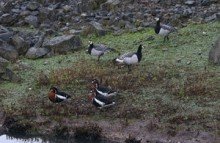Bird flu has been detected in 17 wild birds in Dorset, the Department of Environment, Food and Rural Affairs has confirmed today, with more expected over the coming days.
This is the first confirmed finding of the virus in the UK this winter and tests have shown it is closely related to the H5N6 strain that has been circulating in wild birds across Europe in recent months. This is different to the strains which affected people in China last year and Public Health England have advised the risk to public health is very low. The Food Standards Agency have said that bird flu does not pose a food safety risk for UK consumers.
UK Chief Veterinary Officer, Nigel Gibbens, said:
This is the first time avian flu has been identified in the UK this winter and while the disease does not represent a threat to the public, it is highly infectious and deadly to birds.
As the virus has been circulating across Europe, this finding has not come as a surprise. But it is vital that anyone who keeps birds – whether a few in a back garden or thousands on a farm – is vigilant for any signs of disease, reports suspect disease to APHA and maintains good biosecurity to reduce the risk of their birds becoming infected.
While there is no legislative requirement to put restrictions in place when this strain of virus is found in wild birds, the Chief Veterinary Officer has confirmed local measures will be introduced to help manage the potential threat.
A local ‘avian influenza prevention zone’ will be introduced in the area of Dorset where the diseased birds were found. This means it will be mandatory for all captive bird keepers to put enhanced biosecurity measures in place such as feeding and watering birds indoors to minimise mixing with wild birds, minimising movement in and out of bird enclosures, cleaning and disinfecting footwear and keeping areas where birds live clean and tidy. This will be in place until further notice and will be kept under regular review as part of our work to monitor the threat of bird flu.
There are no plans to carry out any culls or put movement restrictions in place.
The risk to domestic poultry nationally remains low, however good biosecurity is essential and bird keepers across the country are reminded to follow our biosecurity advice which includes specific advice for keepers of backyard flocks.
Poultry keepers and members of the public should report dead wild birds to the Defra helpline on 03459 33 55 77 and keepers should report suspicion of disease to APHA on 03000 200 301.
Trade should not be affected following the findings in wild birds, according to the rules of the World Animal Health Organisation (OIE).
Background
- The risk to poultry and other captive birds depends, amongst other things, on the level of biosecurity on the premises and the likely contact between kept birds and wild birds, which is why it is essential that all keepers remain vigilant and ensure they practice the highest standards of biosecurity.
- Find out if you are in the local ‘avian influenza prevention zone’ by typing in your postcode
- Keep up to date with the latest Avian Influenza situation







